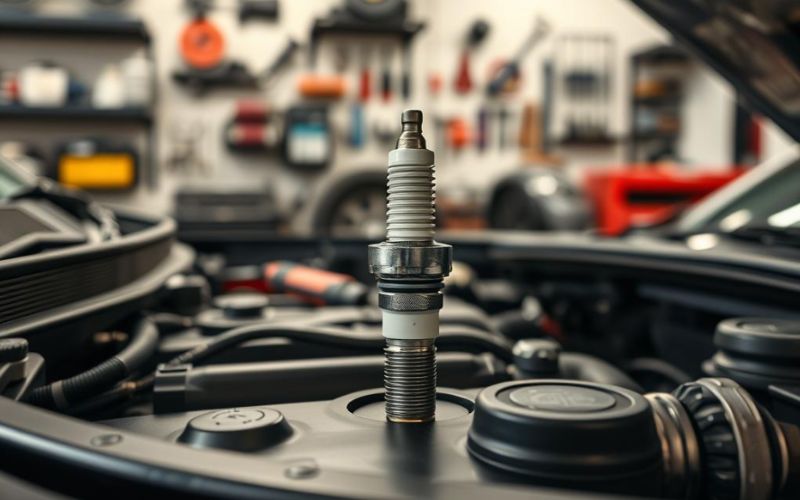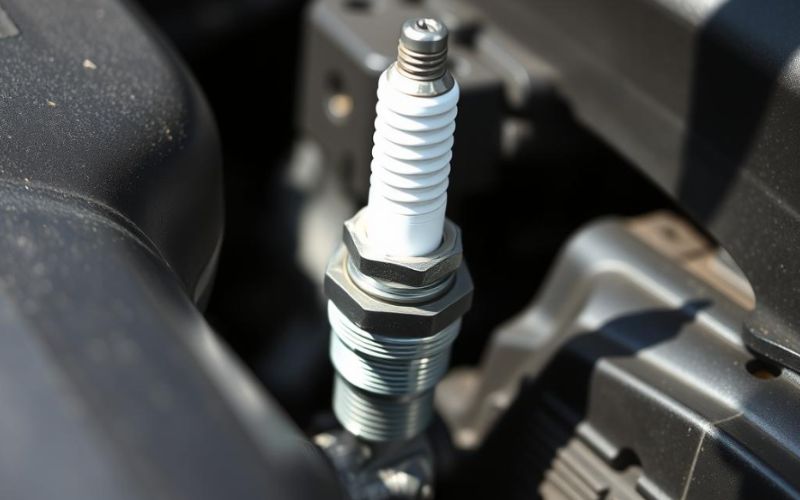Ever had a car that idles rough or runs less well? These problems can be annoying and expensive if not fixed fast. A loose spark plug might be the cause, leading to many issues with your car’s health.
A loose spark plug can really harm your car if not fixed. Knowing the signs and how to fix them is key to keeping your car running well. This article will show you how to spot and fix loose spark plug problems, helping your car stay in top shape.
Topic Summary
- Understanding Spark Plugs and Their Function
- Common Loose Spark Plug Symptoms in Car
- Potential Causes of Loose Spark Plugs
- Diagnosing a Loose Spark Plug
- How to Fix and Prevent Loose Spark Plugs
- Tools Needed For Spark Plug Maintenance
- Step-by-Step Guide to Properly Tighten Spark Plugs
- Removing The Spark Plug
- Inspecting The Threads
- Applying Anti-Seize Compound (When Appropriate)
- Proper Torqueing Techniques
- Thread Repair Options For Damaged Cylinder Heads
- Maintenance Schedule to Prevent Future Issues
- Conclusion
- FAQs on Loose Spark Plug Symptoms in Car: Causes And Fixes
- What Are The Common Signs of a Loose Spark Plug in My Car?
- Can a Loose Spark Plug Cause My Engine to Misfire?
- How Do I Diagnose a Loose Spark Plug?
- What Are The Possible Causes of Loose Spark Plugs?
- Can I Fix a Loose Spark Plug Myself, or Do I Need Professional Help?
- How Can I Prevent Loose Spark Plugs in The Future?
- What Tools Do I Need to Tighten Spark Plugs Correctly?
- How Often Should I Check My Spark Plugs?
Key Takeaways
- Recognizing the symptoms of a loose spark plug
- Understanding the possible reasons for loose spark plugs
- Learning how to fix a loose spark plug
- Preventing future spark plug problems
- Keeping your car running smoothly
Understanding Spark Plugs and Their Function
Spark plugs are often ignored, but they’re key to your car’s health. They help start the engine by igniting fuel and air inside the cylinders.
What Are Spark Plugs and How Do They Work?
Spark plugs are electrical parts in your engine. They spark the fuel-air mix, making your engine run. They have a metal part and can handle the engine’s heat and pressure.
So, how do they work? They get a high voltage from the ignition coil. This creates a spark between the metal and ground, starting the fuel-air mix.
The Importance of Properly Secured Spark Plugs
Spark plugs must be tight to keep your engine running well. A loose plug can make your engine less efficient, cause misfires, and even harm the engine.
Common Reasons Why Spark Plugs Become Loose
Spark plugs can loosen for several reasons. Some common causes are:
- Improper installation or not tightening enough
- Worn-out threads in the cylinder head
- Thermal changes in the engine
- Engine vibrations
To find spark plug issues, knowing these reasons helps. Regularly check your spark plugs.

Common Loose Spark Plug Symptoms in Car
A loose spark plug can cause many problems in your car. It can make your car less efficient and cause engine misfires. It’s important to spot these symptoms early to avoid expensive repairs.
Engine Misfiring and Rough Idling
One sign of a loose spark plug is engine misfiring. This happens when the spark plug doesn’t fit right, leading to incomplete combustion. Your engine might run unevenly or stall when stopped.
You might see engine misfire indicators on your dashboard. Or, you might feel the engine vibrating more than usual.

Decreased Fuel Efficiency
A loose spark plug can also make your car use more fuel. If the spark plug doesn’t ignite the fuel-air mixture right, you’ll use more gas. This means you’ll need to fill up more often, which can be expensive.
Loss of Engine Power and Acceleration
Loose spark plugs can make your car feel slow or hesitate when you press the gas. This is because the spark plug affects how well the engine burns fuel. It’s a big problem because it makes driving less safe and less fun.
Unusual Engine Noises
Strange noises from your engine could mean a loose spark plug. You might hear knocking, pinging, or rattling sounds. These sounds are a warning that something is wrong, and you should check your spark plugs fast.
Check Engine Light Illumination
A loose spark plug can also turn on the check engine light. Modern cars have systems that can find problems like loose spark plugs. If the light comes on, it’s a sign you need to get your car checked by a mechanic.
Knowing these symptoms can help you catch problems early. If you notice any of these issues, check your spark plugs and get help if needed.
Potential Causes of Loose Spark Plugs
Knowing why spark plugs get loose is key to fixing them. Loose spark plugs can cause many engine problems. These include misfires, bad fuel efficiency, and even engine damage. Finding the main cause helps fix the issue right.
Improper Installation or Torque
One big reason spark plugs get loose is bad installation or wrong torque. If spark plugs aren’t tightened right, they can get loose. This can mess up how the engine runs. “Getting the torque right is very important,” says a top car tech. Always follow the car maker’s spark plug installation guide.

Worn Cylinder Head Threads
Loose spark plugs can also come from worn-out cylinder head threads. These threads can wear down from engine heat and stress. When this happens, spark plugs don’t stay tight, causing problems.
Thermal Expansion and Contraction
Engines expand and contract with heat, affecting spark plug tightness. As the engine warms up and cools, parts move. This can make spark plugs loose if they’re not well-secured or if there’s trouble with the cylinder head or threads.
Vibration and Engine Stress
Car engines vibrate a lot, which can make spark plugs loose. These vibrations are more noticeable when the engine is under heavy load. If spark plugs aren’t tightened right or if the engine has mounting or balancing issues, they can get loose.
Understanding these causes helps car owners and mechanics fix loose spark plugs. This keeps the engine running well and efficiently.
Diagnosing a Loose Spark Plug
If your car is having trouble, a loose spark plug might be the cause. Finding out if it’s loose is the first step to fixing it. A loose spark plug can cause many engine problems, so it’s important to find and fix it fast.
Visual Inspection Techniques
Start by looking at the spark plug area. Look for wear, damage, or looseness around the spark plug boots and wires. Also, check the spark plug wires for cracks or damage.

Using Diagnostic Tools
Modern cars have onboard diagnostics (OBD) systems. These systems can tell you a lot about your engine. Use a code reader or scan tool to find trouble codes related to spark plugs or the ignition system.
This can help you know where to start with your diagnosis.
Performing a Compression Test
A compression test can tell you if a spark plug is loose or if there’s a bigger engine problem.
With a compression gauge, you can check the pressure in each cylinder. A low reading in one cylinder might mean a loose spark plug or another engine issue.
When to Consult a Professional
If you’re not sure about diagnosing a loose spark plug, or if you find something more complex, get a professional mechanic’s help.
They have the right tools, experience, and knowledge to fix your car right. This way, your car will run well and efficiently.
How to Fix and Prevent Loose Spark Plugs
To keep your car running well, it’s key to know how to fix and prevent loose spark plugs. Loose spark plugs can cause your car to run poorly and use more fuel. With the right tools and a little knowledge, you can fix and prevent these problems.
Tools Needed For Spark Plug Maintenance
Before starting, make sure you have the right tools. You’ll need a spark plug socket, a ratchet, and a torque wrench. You might also need an extension or a spark plug gap tool, depending on your car.
- Spark plug socket
- Ratchet
- Torque wrench
- Extension (if necessary)
- Spark plug gap tool (if necessary)
Step-by-Step Guide to Properly Tighten Spark Plugs
It’s important to tighten spark plugs right to avoid them becoming loose. Here’s a simple guide to help you do it.
Removing The Spark Plug
First, take out the spark plug with a spark plug socket and ratchet. Make sure the engine is cool to avoid damage.
Inspecting The Threads
Look at the threads in the cylinder head for dirt or damage. Clean them if needed.
Applying Anti-Seize Compound (When Appropriate)
If your spark plug needs it, put a little anti-seize compound on the threads. But don’t use too much, as it can cause problems.
Proper Torqueing Techniques
Use a torque wrench to tighten the spark plug to the right torque. This makes sure it’s tight but not too tight.
Thread Repair Options For Damaged Cylinder Heads
If your cylinder head threads are damaged, there are ways to fix them. You can use a thread repair kit or, for serious damage, see a professional machinist.
- Check the damage to pick the best fix.
- Use a thread repair kit for small damage.
- See a pro for big damage.
Maintenance Schedule to Prevent Future Issues
To stop loose spark plugs later, add spark plug checks to your regular car care. This helps find problems early, before they get big.
- Check spark plugs every 30,000 miles.
- Replace spark plugs as your car’s maker says.
- Watch your car’s performance for spark plug signs.
Conclusion
Now you know about loose spark plugs’ symptoms, causes, and fixes. It’s key to keep them in good shape to avoid problems later. Regular checks and tight spark plugs help your car run better, use less fuel, and stay healthy.
Knowing the signs of loose spark plugs is important. Look out for engine misfires, less fuel efficiency, and odd noises. Fixing these issues early can prevent bigger problems.
Following the tips in this article will keep your car’s engine running well. Keep up with spark plug maintenance. Your car will thank you with better performance and reliability.
FAQs on Loose Spark Plug Symptoms in Car: Causes And Fixes
What Are The Common Signs of a Loose Spark Plug in My Car?
A loose spark plug can cause your engine to misfire. It might also make your car idle roughly. You might notice your car uses more fuel than usual. It could also lose power and speed. You might hear strange noises from the engine. And, the check engine light might turn on.
Can a Loose Spark Plug Cause My Engine to Misfire?
Yes, a loose spark plug can make your engine misfire. This happens because the fuel-air mixture doesn’t ignite right. This leads to a rough engine performance.
How Do I Diagnose a Loose Spark Plug?
To find a loose spark plug, you can visually check it. Use diagnostic tools to help. A compression test can also show if there’s a problem with the spark plug.
What Are The Possible Causes of Loose Spark Plugs?
Loose spark plugs can be caused by a few things. Improper installation or not tightening enough is one. Worn-out cylinder head threads can also cause it.Thermal expansion and contraction, and engine vibration can also play a part. Engine stress is another possible cause.
Can I Fix a Loose Spark Plug Myself, or Do I Need Professional Help?
You can tighten a loose spark plug yourself. But, if you’re not sure or the problem keeps coming back, get a mechanic’s help.
How Can I Prevent Loose Spark Plugs in The Future?
To avoid loose spark plugs, make sure they’re installed right and tightened correctly. Check your spark plugs often. Keep up with your car’s maintenance schedule. Replace spark plugs when needed to prevent problems.
What Tools Do I Need to Tighten Spark Plugs Correctly?
To tighten spark plugs right, you’ll need a spark plug socket. A ratchet and a torque wrench are also necessary. They help ensure the spark plugs are tight but not over-tightened.
How Often Should I Check My Spark Plugs?
Check your spark plugs every 30,000 to 100,000 miles. This depends on your car’s make, model, and spark plug type. Regular checks help keep your engine running smoothly.

